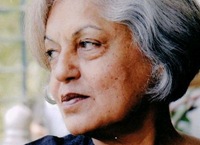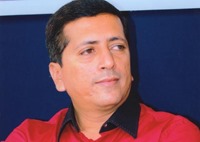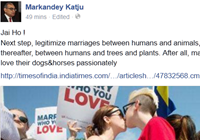Supreme Court
 Senior advocate Indira Jaising has filed a public interest litigation (PIL) in the Supreme Court today to challenge the “non transparent and arbitrary method of designating senior counsel by the Supreme Court”.
Senior advocate Indira Jaising has filed a public interest litigation (PIL) in the Supreme Court today to challenge the “non transparent and arbitrary method of designating senior counsel by the Supreme Court”.
The Supreme Court dismissed a Right to Information (RTI) appeal that had asked for judges’ medical expenses, citing judges’ right to privacy, reported the Indian Express.
The court was hearing advocate Prashant Bhushan for RTI activist Subhash C Aggarwal.
A bench headed by Chief Justice of India (CJI) HL Dattu said: “There should be some respect for privacy and if such information is disclosed, there will be no stopping. Today, someone is asking for information on medical expenses. Tomorrow, he will ask what are the medicines purchased by the judges. When there will be a list of medicines, he can make out what type of ailment the judge is suffering from. It starts like this. Where does this stop?”
Bhushan argued that this decision will set a bad precedent for other public servants who will use it to stonewall similar requests.
PTI reported that a Himachal Pradesh judge has alleged that she was sexually harassed by another judge during a national-level conference on drug abuse in Manali. The high court’s chief justice Mansoor Ahmad Mir has ordered an inquiry:
As per the complaint of the woman judge, she was asked to come to Manali in advance for making preparations for the conference being attended by Judges of Supreme Court and High Courts.
On June 8, the accused tried to pressurise the woman judge to accompany him to a resort and allegedly misbehaved with her.
A Madhya Pradesh district court judge had made a complaint last year, which resulted in the Supreme Court setting out new guidelines about how to investigate harassment in the judiciary.
 Karnataka high court and Supreme Court advocate KV Dhananjay has commissioned a web developer to build a website that is intended to allow advocates to rate judges on three parameters - knowledge, integrity and cordiality.
Karnataka high court and Supreme Court advocate KV Dhananjay has commissioned a web developer to build a website that is intended to allow advocates to rate judges on three parameters - knowledge, integrity and cordiality.
Madhya Pradesh district and sessions judge Jagdish Baheti has filed a petition before the Supreme Court over the Madhya Pradesh high court collegium’s decision to elevate his juniors but not him, due to a chargesheet against him alleging that he had granted defendants anticipatory bail on the basis of incorrect facts, reported the Indian Express’s Utkarsh Anand.
He has asked for the elevation process to be stayed until the close of the internal inquiry against him in the case that will be heard by Chief Justice of India (CJI) HL Dattu in July, Baheti had made the news in 2013 for concluding a rape trial in nine days, and had previously appealed before the Supreme Court the inquiry against him, which had told the high court to hear his plea where it was dismissed.
DV Sadananda Gowda, commenting on the US Supreme Court’s national country-wide legalisation of gay marriage last week, said that the government could de-criminalise gay sex under section 377 of the Indian Penal Code and might even consider gay marriage as an option.
“The mood appears to be in favour of it. But it can be done only after widespread consultations and taking all views into account,” he told the Economic Times.
Update: Gowda has told ANI News that he was "totally misquoted": "When I was asked about the judgment that was given by the US court, I said that it is not an easy task in our country. So, the people of that country might have accepted it but here it has to be widely debated. Only then can something be done. Otherwise, it is not an easy task. So, we have no idea of scrapping or doing anything about [Section] 377."
Hat-tip: @mohitsingh8 and @sayantan_b on Twitter
"Justice [Gyan Sudha] Misra, who although sat a little after the scheduled time, never compromised by rising just after half-an-hour. She was the last one to leave the court premises, be it the Supreme Court or High Court. There were absolutely no cause-lists that were not exhausted by her and no judgments that were not churned out by her,” wrote her daughter, advocate Unnati Misra, in a letter to attorney general Mukul Rohatgi, as reported by the Indian Express’s Utkarsh Anand.
She was referring to Rohatgi’s repeated attacks on now retired Supreme Court judge Justice Misra’s habit of coming late to court as a notable example of a bad appointment made by the collegium, in his argument for the National Judicial Appointments Commission (NJAC) before the Supreme Court, saying he had “run down the reputation of people who have given their sweat and blood to judicial institutions, all in the name of NJAC, are reflective of bias and based on superficiality”.
However, Unnati Misra said that her mother had been recommended for the Supreme Court in 1986 before the collegium system and she was approved by six chief justices and Chief Justices of India (CJIs) before her elevation to the apex court in 1998 as the fourth woman to ever do so. She also wrote that her Justice Misra had fought “personal battles” caring for her ill husband, who passed away shortly after her retirement.
In 2013, Justice Misra had hit back at a Times of India column arguing that judges were “ultimately human beings” and not “robots”, and that judges “cannot be expected to give an account of every single minute or else face derogatory publicity”.
 In a landmark judgement, the US Supreme Court ruled on Friday that gay people can marry nationwide and states cannot ban same-sex marriage - an issue that divides America and India.
In a landmark judgement, the US Supreme Court ruled on Friday that gay people can marry nationwide and states cannot ban same-sex marriage - an issue that divides America and India.
 Wherever the legal system is perceived as being unable to deal with something speedily or fairly, the media can and will step into the breach, for better or for worse, argues Kian Ganz.
Wherever the legal system is perceived as being unable to deal with something speedily or fairly, the media can and will step into the breach, for better or for worse, argues Kian Ganz.
The Karnataka government today moved the Supreme Court challenging the state high court's verdict acquitting Tamil Nadu Chief Minister J Jayalalithaa, her aide Sasikala Natrajan and two others in a case of disproportionate assets.
The Karnataka government has urged the apex court to stay the operation of the May 11 verdict.
"Pass an ex-parte ad-interim order of stay, staying the operation of impugned final judgment and order of May 11," a petition by the Karnataka government said in its prayer for interim relief.
The Karnataka government contended that the high court committed a "grave mistake" in arriving at a figure of Rs 24,17,31,274 while a total of 10 loans taken by Jayalalithaa and others and the companies they were associated with was Rs 10,67,31,274.
It is because of this "grave mistake" in the calculation that the high court erroneously concluded that the disproportionate assets were only to the extent of 8.12 percent of the income whereas it was 76.7 percent.
Contending that the reversal by the high court of the trial court verdict convicting Jayalalithaa had resulted in "miscarriage of justice", the Karnataka government said that apart from other infirmities, the "grave mistake" had led to the acquittal of Jayalalithaa and others including VN. Sudhakaran and J Elavarasi.
The Karnataka government has questioned whether Jayalalithaa's appeal against the trial court order convicting her and others was maintainable without making Karnataka a respondent.
The state has contended that because Jayalalithaa and the others did not make the Karnataka government a party to the case, it could not appoint a public prosecutor to pursue it.
The trial court in Bengaluru on Sep 27 convicted Jayalalithaa of possessing assets disproportionate to her known sources of income and awarded four jail terms and fined her Rs 100 crore.
The case dates to the period from 1991 to 1996 when Jayalalithaa was the chief minister of Tamil Nadu.
The Karnataka government had earlier this month decided to appeal the acquittal, after special public prosecutor BV Acharya had recommended that it was a case fit for appeal in May.
The politico’s acquittal by the Karnataka high court was widely criticised for dubious maths and reasoning.